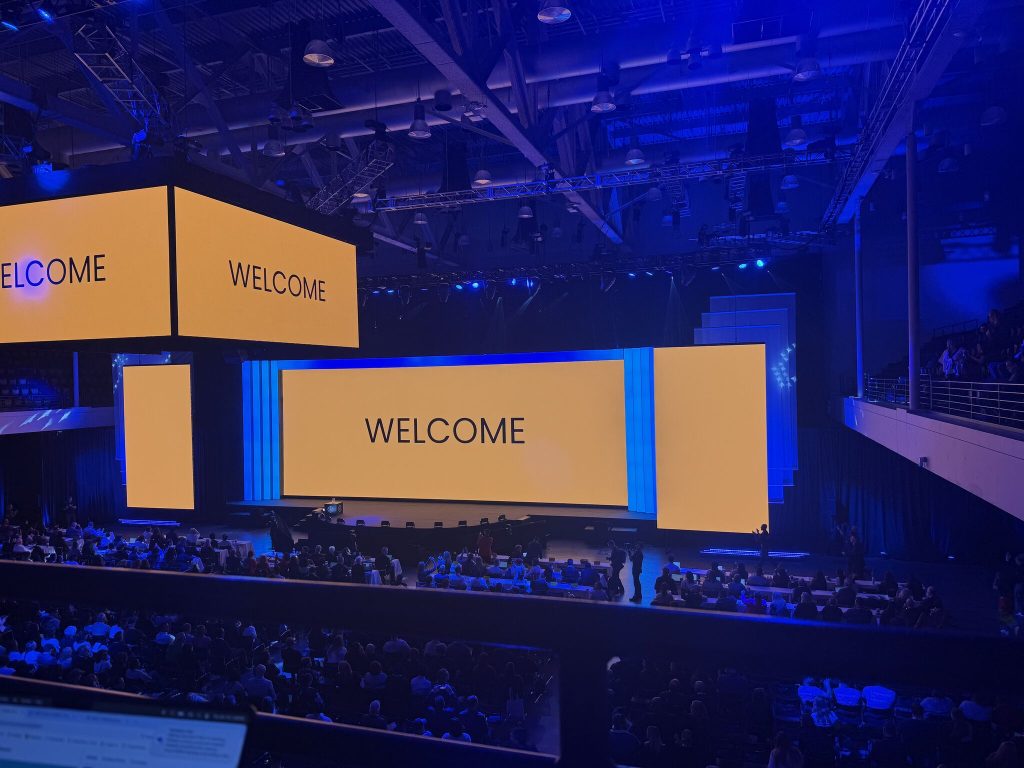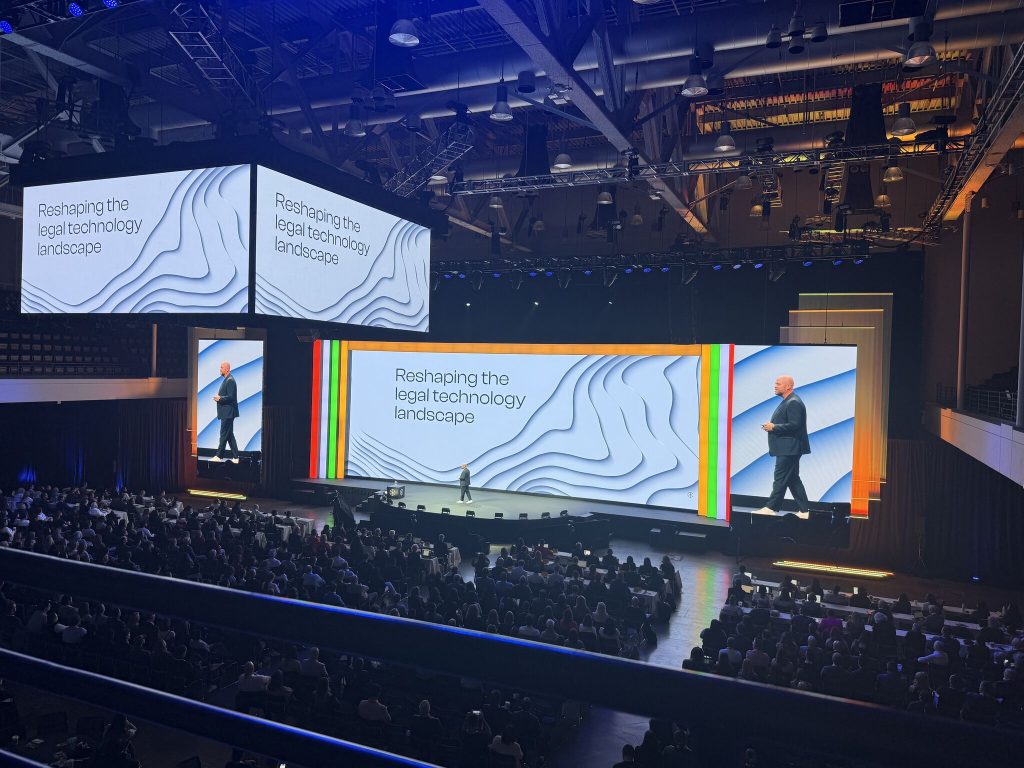October 16/17 2025 saw the 13th annual ClioCon conference take place in Boston. This was the fourth Clio Con that myself and the Cashroom attended, starting online during Covid and exhibiting and attending in Nashville in previous years. It’s an impressive event, in-fact there isn’t another that comes close in the legal event diary, with approximately 2,700 in-person attendees and 2,600 virtual participants from across the globe. The theme of the event, “Uniting Brilliance”, set the tone for an expansive agenda spanning legal tech innovation, practice management transformation, operational scaling, and the changing shape of the profession.
What really struck many attendees was the sheer scale of product announcements and the bold positioning of Clio moving from “practice management software” to what they termed an “intelligent legal work platform”. Much of which has also been shared publicly this week with the news of a US$1 billion acquisition of vLex as well as closing a US$500 million Series G funding round led by New Enterprise Associates (NEA), valuing Clio at US$5 billion. 
Keynote by Jack Newton & Major Announcements
In his opening keynote, Jack Newton laid out the vision for where Clio sees the legal profession heading and where his company wants to lead it. A few of the headline announcements:
- Clio Operate – A new offering for large law firms (formerly the ShareDo platform) intended to bring matter, document and workflow management at scale into the Clio ecosystem. Results cited in Clio’s blog: up to 40% reduction in case lifecycle, 80% faster matter creation, 30% increase in fee earner capacity.
- Clio Library – A massive research platform built in: over 1 billion legal documents from 100+ countries, with advanced tools (Precedent Map, Key Passages) for insight and research.
- Managed AI / Vincent by Clio / Draft AI / Grow AI – Clio is embedding AI across its stack. For example, “Manage AI” automates business operations (billing, scheduling, filing); “Vincent” is positioned for legal research and analysis; “Draft AI” within Clio Draft for document assembly; “Grow AI” for client intake, screening and conflict checks.
- Clio Accounting & Payments updates – On the financial operations side, Clio announced enhancements: e.g., cheque printing support (within Clio Accounting) and improvements to Clio Payments (Text To Pay, Pay Later, subscription billing).
- The overarching message: moving from a “system of record” (just tracking matters, time, billing) to a “system of action” — a platform where data, workflow, operations, AI and insights are embedded and connected.
In short: it was an ambitious set of announcements. The “wow” factor among attendees was real, and for good reason: the legal technology landscape is changing, and Clio clearly wants to be a driving force. At Cashroom, we have access to and regularly work across more than 30 different case management systems; we use whatever platform our clients prefer. And from that vantage point, we can confidently say this is the most impressive and comprehensive set of updates we’ve ever seen from any provider in the sector. Clio isn’t just adding features — they’re reshaping what a legal platform can be.
What Made the Event Great
What Made the Event Great
There’s a lot to like and celebrate from ClioCon 2025:
- The scale: a major gathering of legal professionals, technology vendors and industry thinkers; which means good networking, vendor exposure, cross-fertilisation of ideas.
- The breadth of content: from solos and small firms to large enterprises; from tech deep-dives to practice management and client experience.
- The message of transformation: the keynote and sessions struck a note of urgency (but also possibility). For many firms the “business as usual” model no longer applies; the conference helped shift mindsets.
- Practical focus: sessions aimed at real workflows, real pain points (intake, client experience, scaling, efficiency) rather than just lofty vision.
- Inspiration: Keynotes from thought leaders (e.g., the inclusion of renowned speakers) alongside the tech announcements helped give context to why change matters, not just how.
But one update made a deeper point – about how far the profession still has to go
Here’s where things got interesting for us. Among the announcements, one that might fly under the radar for many but is in fact quite telling: the support for check printing in Clio Accounting and the Clio/QuickBooks Online integration.
At first glance that might seem like a mundane accounting feature. But consider:
- In a world where banking, payments and finance have moved increasingly online (ACH, wire, card, e-payments, digital reconciliation), the fact that check printing remains such a headline matter speaks volumes.
- In the legal profession, especially US law firms, regulatory frameworks around client funds/trust accounting, three-way reconciliation (client ledger vs trust bank vs firm books), anti-money laundering, conflict of interest, etc., are complex and rigorous. Yet in practice many firms still rely on checks, manual reconciliation, physical signatures, paper flows.
- The update shows that even a leading legal tech vendor is still accommodating “old school” workflows (print a check, sign it, mail it) rather than enabling a fully digital, frictionless, bank integrated workflow.
- It thus underscores a gap: the legal industry (in the US) may cognitively be excited about AI, workflows and tech transformation, but when you look at core financial operations (trust accounting, banking, compliance) the infrastructure – both operationally and regulatorily – still lags behind other sectors (fintech, general business services) and other jurisdictions perhaps with more unified regulation.
Put differently: while the “sexy” announcements were AI, research libraries, automation, the check/print check update highlights a deeper truth: law firms are still dealing with legacy practices in their finance and compliance stack. This should prompt reflection: if even firms using tech like Clio still need to print checks, what does that say about the pace of transformation in the profession at large? 
Regulatory and Compliance Implications
- Trust / IOLTA / client funds reconciliation: Many state bar regulators in the US require rigorous tracking of client funds, prompt disbursement, clear segregation, audit trails. When firms rely on checks, manual signature, mailing, there’s more room for delay, error or risk.
- Banking integration & real-time visibility: Modern accounting practices increasingly expect bank feeds, real-time reconciliation, alerts for anomalies (overdrafts, unauthorized transfers). If check printing is still a standard part of the workflow, firms may lack that real-time visibility.
- Fraud and controls: Checks carry more risk (physical theft, alteration, forgery) than many supported e-payment workflows. So, the persistence of check workflows implies persistent risk vectors.
- Global comparators: In many jurisdictions (Europe, UK included) regulatory regimes are pushing toward digital, traceable, client funds workflows. The US is behind. In the UK Cashroom work with over 300 law firms and less than 5% of payments are done via check.
- Cost, efficiency and client expectations: Clients increasingly expect speed, transparency, ease of payment (online portals, mobile payments); if a firm’s back office is still printing and mailing checks, this affects competitiveness.
- Technology adoption vs legacy systems: Even when firms adopt a modern practice management platform like Clio, the ancillary workflows (banking, client funds, disbursements) may still be built around paper. That mismatch causes friction, inefficiency and risk.
So while the announcement is framed as a “feature enhancement” (“we now support check printing in Clio Accounting”), implicitly it raises the question: why is check printing still part of the roadmap? What does that tell us about how ready the profession is for fully digital finance operations?
Final Thoughts
Ultimately, the check-printing announcement was a reminder that while technology can move fast, cultural and regulatory change often lags behind. The U.S. legal sector, for all its innovation, still faces major structural barriers in financial operations and trust accounting that technology alone can’t solve – at least, not yet.
That’s where collaboration between legal tech and specialist outsourced providers becomes critical. As Cashroom continues to expand across the U.S., we’re already seeing how our expertise is helping firms modernize their accounting and compliance frameworks – improving efficiency, accuracy, and oversight while integrating seamlessly with platforms like Clio. And with California introducing compulsory trust-accounting audits, scrutiny around financial transparency is only set to tighten. Firms that act now will not only stay compliant but gain a strategic advantage.
Those that get ahead of the curve, by partnering with trusted providers such as The Cashroom and Clio, will lead the next phase of transformation in legal operations: one defined not just by innovation, but by confidence, control, and complete financial integrity.
Thank you to our partners and friends at Clio for a great event!


